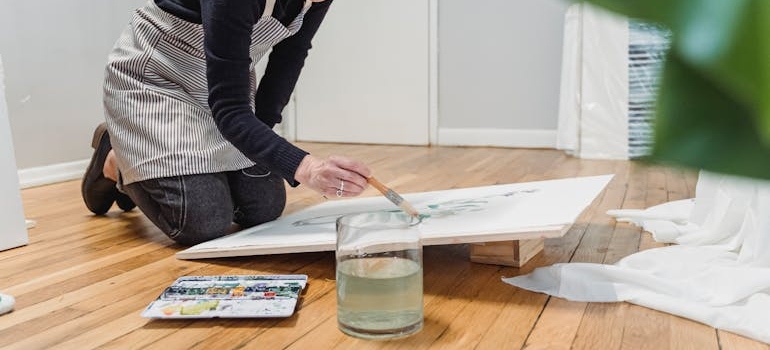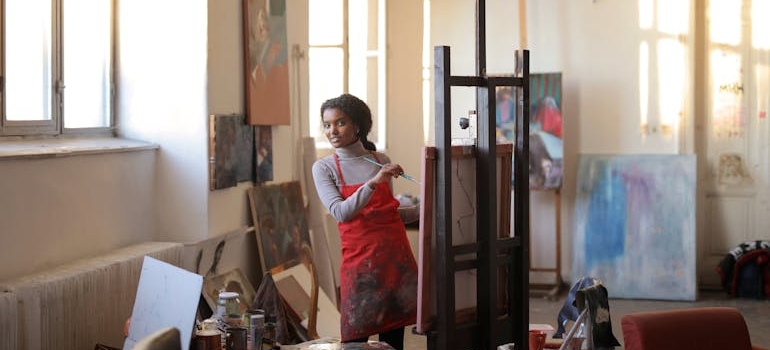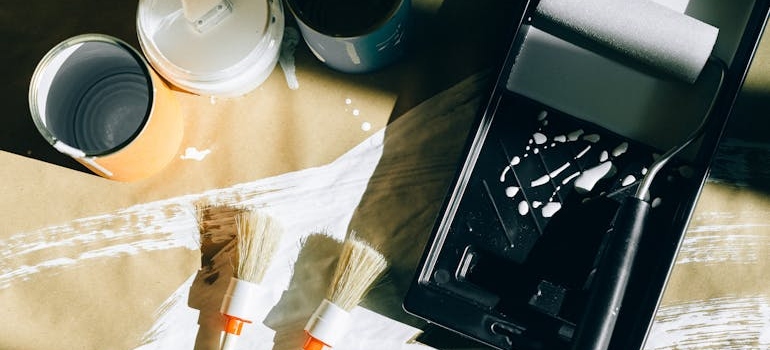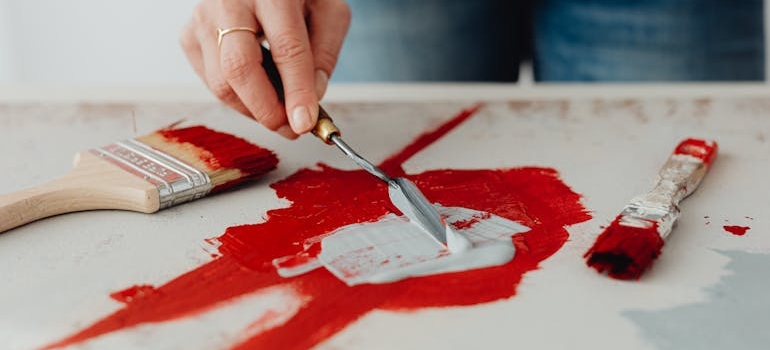How to pack wall art for moving matters when protecting fragile items during stressful transitions. Artwork often carries personal or financial value. Movers must handle these pieces with careful attention. Paintings, prints, and photographs often face risks during transportation. Frames can crack. Glass can shatter. Canvas surfaces can tear. Improper packing can destroy something precious forever. Movers with proper experience prevent unpleasant surprises. Experienced professionals handle delicate materials with proven methods. Reliable services such as Movers East Bay Area often reduce stress. Their teams know the correct packing strategies and shipping procedures. Many people underestimate the importance of thoughtful planning. Artwork often differs from standard belongings. Fragile items demand unique steps. People often lack proper materials or time. Solid advice simplifies this task. Wise preparation avoids damage and disappointment.
Gather the Right Packing Materials
Quality materials lead to better protection. Cardboard boxes must resist pressure. Bubble wrap must absorb shocks. Packing paper must provide a clean layer. Corner protectors guard delicate edges. Packing tape secures everything firmly. Labels and markers prevent confusion later. Strong materials improve results. Durable boxes hold firm. High-grade bubble wrap prevents direct contact. Proper paper avoids scratches. Corner guards prevent chips. Quality tape seals tight. Clear labels guide handlers. Each item contributes something important.

Essential Supplies You’ll Need
Consider investing in the following materials:
- Sturdy cardboard boxes sized to fit each piece
- Bubble wrap with multiple layers
- Clean packing paper that does not scratch surfaces
- Corner protectors to guard frame edges
- Strong packing tape that holds under pressure
- Labels for clear instructions and room names
- Waterproof markers to write warnings and directions
These supplies work together. Cardboard boxes provide structure. Bubble wrap absorbs shocks. Paper prevents abrasions. Corner protectors reinforce frame integrity. The tape holds everything inside. Labels guide careful handling. Markers convey warnings. Each tool supports safety.
High-quality materials prevent major issues. Weak cardboard buckles under weight. Thin bubble wrap tears easily. Cheap tape peels off during transit. Poor corner protectors fail when boxes shift. Moisture enters low-quality boxes. That harms paint. Frames crack under stress. Proper materials protect your investment. They allow stable conditions. Artwork remains dry and secure. Proper supplies cost less than artwork repairs. Spending a bit more now avoids future regrets. Quality materials safeguard memories and financial value.
Steps to Pack Wall Art Safely
Clear steps improve results. Organization prevents panic. Start early. Avoid rushing. Examine each piece first. Prepare an area dedicated to packing. Keep materials close and work methodically through each artwork. Secure everything before moving forward. Consistency reduces mistakes. Each completed piece feels like progress so continue until all art rests safely inside boxes.
Clean each piece with a soft cloth. Check surfaces under bright light. Identify existing scratches or chips. Document them with photos. Remove any hanging hardware. Hooks or wires can snag packing materials. Take frames off if possible. Separate frames and prints. Keep these parts organized. Store small pieces in labeled bags. Clean surfaces reduce dust-related scratches. Intact frames allow easier wrapping. Preparing now avoids issues later. Handle artwork gently. Respect delicate finishes and materials.

Place the artwork on a clean table. Cover it with packing paper and wrap bubble wrap around the piece and secure it with tape. Add corner protectors. Insert the artwork into a slightly larger box. Fill gaps with crumpled paper. Prevent movement inside the box. Check that nothing shifts when lifted. Label the box with a marker. Write “Fragile” and “This Side Up.” This alerts handlers. Make sure edges have enough padding. Double-check tapes for firmness.
Regional professionals such as movers Benicia CA understand local conditions. They navigate narrow streets so they know local regulations. You can rest assured they will arrive with suitable vehicles. They handle fragile shipments gently and suggest suitable packing methods. Local experts often offer personal consultations, which ensure correct handling. Trusting a known service helps maintain peace of mind. Communication with local professionals clarifies expectations.
Storage Needs
Some people face delays and storage solutions help. Storage Benicia CA services provide climate-controlled units. They maintain stable temperatures. They prevent moisture damage. Consider storage options if arrival dates change. Secure facilities protect valuable art until final delivery. Storing boxes temporarily reduces stress. It also prevents rushed unpacking. Calm transitions produce better outcomes.
Challenges with Uncommon Art Shapes
Some artwork features unusual shapes. Odd dimensions require custom boxes. Large pieces need reinforced containers. Sculptural art may demand wooden crates. Light padding may fail in these scenarios. Special foam inserts help. Professional framers offer advice. Custom solutions protect rare pieces. Avoid guessing. Improper packing destroys fragile components. Specialists solve these tricky cases.
Consider Climate Conditions
Moisture hurts wood frames. Humidity affects canvas tension. Extreme heat may damage adhesives. Place artworks in climate-controlled spaces. Never leave them in hot vehicles. Keep them dry. Avoid direct sunlight during packing. Stable temperatures protect paint. Consistency preserves integrity. Climate considerations matter during long trips. Professional movers handle climate control requests. This ensures proper conditions.

Insurance Considerations
Accidents happen, but insurance provides reassurance. Document the art’s current condition. Store receipts or appraisal documents. Confirm coverage with the moving company. Some policies require professional packing. Ask questions about claims. Understand coverage limits. Insurance replaces or repairs damaged items. This cost seems small compared to potential losses.
Handling Large Collections
Some collectors own dozens of artworks. Packing them requires patience. Tackle them in batches. Assign a few hours daily. Check each piece’s frame stability. Worn frames need reinforcement. Secure every artwork well. Large collections present more chances for errors. Consistent methods prevent damage. Consider professional help if collections seem overwhelming.
Corner protectors guard frames and edges. Frames often chip during impacts. Protectors absorb shocks. Choose adjustable versions that fit various thicknesses. They cost little but save repairs. Slide them snugly on each corner. Tape them to prevent slipping. Secure corners first. Strong corners form a stable foundation.
Quick Tips
Consider the following quick suggestions for safer packing:
- Inspect each piece carefully before wrapping
- Use multiple layers of bubble wrap
- Add corner protectors for all framed pieces
- Label boxes with clear instructions
- Consider insurance for valuable artwork
- Think About Vehicle Loading
Place art boxes upright. Avoid stacking heavy items on top. Secure them against vehicle walls. Fill gaps with blankets or foam. Prevent sliding during turns. Good loading techniques minimize shocks. Professionals know the correct loading order. They handle fragile boxes last. Smooth transit protects valuable cargo.
Useful Techniques
Double-boxing adds layers of defense. Place the wrapped artwork inside a fitted box. Insert that box into another slightly larger box. Fill the space with bubble wrap. This double barrier absorbs strong impacts. Valuable pieces deserve this extra effort. Professional movers often recommend this method. Consider double-boxing for high-value art.
Moisture causes big problems. Select moisture-resistant materials. Use plastic sheets if necessary. Store boxes in dry areas. Avoid damp basements or unventilated garages. Moisture warps wood and damages paint. Dry conditions keep your investment safe. Moisture often appears during long trips. Climate control reduces these risks.

Never place heavy boxes on fragile art containers. Keep art at the top. Consider placing lighter objects around. This prevents crushing frames or glass. Balanced loads travel smoothly. Inexperienced handlers might stack randomly. Clear labeling and supervision prevent that. Correct stacking saves headaches later.
Hiring Professional Services
Professional movers bring training and tools. Trusting professionals frees your time. Relying on experts reduces mistakes. Research reviews and compare services. Choose a reputable company.
Glass requires extra care so try to protect it with a paper layer. Add bubble wrap on both sides. Insert cardboard between glass and canvas. Corner protectors help. Double-boxing reduces breakage risk. Handle glass frames gently. Glass shards pose serious risks. Careful packing avoids those problems.
Domestic shipping services specialize in interstate moves. They pick the best routes and arrange climate-controlled vehicles. It is important that they communicate tracking information and handle insurance coverage and plan schedules efficiently. Domestic services simplify complex moves within the country. They reduce damage risk and deliver consistent quality.
Canvas stretches easily, which means direct pressure might cause dents. Add bubble wrap layers. Make sure no objects press against the canvas. Canvas surfaces need gentle handling. Avoid tight squeezes. Secure them in stable boxes. Treat canvas frames kindly.
Mixed media art includes metal components. Metal edges might cut bubble wrap. Add extra padding to cover sharp parts. Use cardboard dividers. Ensure metal does not rub against delicate surfaces. Mixed media pieces vary widely. Adapt materials as needed. Professional framers may offer specialized tips.
Long-Distance Moves
Long trips increase risks. Trucks travel over rough roads. Temperature changes occur. Vibrations accumulate over time. Double-boxing helps. Consider climate control if possible. Check weather forecasts. Pack stable. Keep records of condition. Contact the moving company for updates. Long trips test your packing quality. Inspect each roll of bubble wrap to make sure no holes appear. Check tape quality. Test box strength. Discard faulty materials. Quality control saves trouble. Better to fix issues now than later. Reliable materials ensure smoother transport. Never settle for damaged supplies.

Start packing earlier than expected. Artwork demands patience. Rushing leads to mistakes. Set a schedule after learning how to pack wall art for moving. Pack a few pieces daily. Avoid all-nighters before moving day. Thoughtful pacing produces better results. Time allows careful decisions. Prevent unnecessary stress. Relaxed packing often yields better protection. Save sturdy boxes for future moves. Keep bubble wrap if undamaged. Store corner protectors. Reuse packing paper. Proper storage prolongs their life. This reduces waste and costs, but make sure to clean materials before reuse. Discard anything worn. Reusable materials help frequent movers.
International Requirements
International moves demand more planning. Customs officials may inspect packages. An international logistics company understands these rules. They ensure correct documentation and advise on special crates. Always here to help handle currency conversions or duties. Professionals handle these challenges. This prevents delays at borders.
Local specialists handle shorter trips. They know regional roads. They resolve small issues easily. Long-distance movers handle complex routes. They manage scheduling across states. Domestic shipping services handle cross-country moves efficiently. Choose movers who suit your situation. Different services address different scenarios.
Upon Arrival
Unload carefully. Move art boxes indoors first. Avoid leaving them in vehicles and remove bubble wrap gently. Check each piece’s condition. Ensure no paint smudges. Hang artwork after checking walls. Stable placement prevents future accidents. Artwork deserves a safe home. Compare pre-move photos with current conditions. Confirm no new scratches. Check frames for cracks. Inspect glass for chips. Document any issues. Contact insurers if needed. Quick action resolves problems. Early detection makes claims easier.

Keep records organized. Art might need time to adjust so wait a day before hanging. Let materials settle. Rooms differ in humidity. Ensure stable environment. Monitor for any signs of warping. Proper conditions keep artwork stable. Enjoy your pieces in a comfortable space.
Pack Wall Art For Moving
How to pack wall art for moving involves choosing the right materials and proper methods. Select sturdy boxes, bubble wrap, corner protectors, and strong tape that keep your art safe. Wrap each piece securely, leaving no loose ends or exposed surfaces that invite damage. Clean frames and glass beforehand, remove hardware, and label boxes with clear instructions on handling. Keep your artwork in climate-controlled conditions that protect fragile paints and delicate materials from moisture. Consult experienced moving professionals who know safe transport methods, suggest proper supplies, and offer insurance options. Stay organized with an inventory list that helps track pieces, avoid confusion, and speed up unpacking. Load artworks last, maintain gentle driving practices, and unload them first upon arrival. Check each piece after arrival and address any issues immediately with professional help or restorers. Enjoy displaying your cherished art in a fresh space that feels calm, truly welcoming, and secure.


